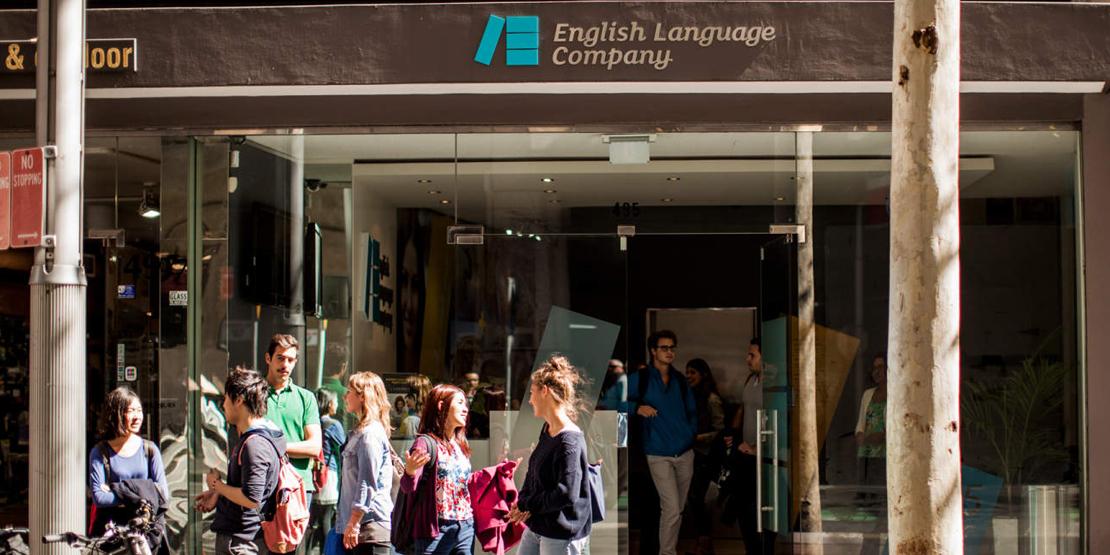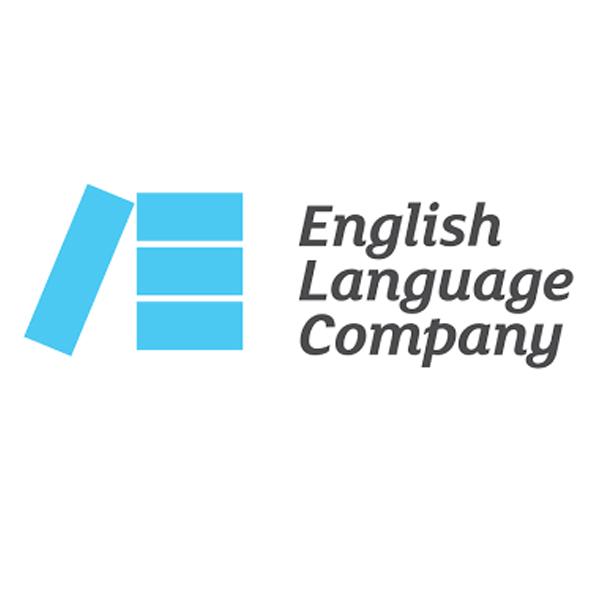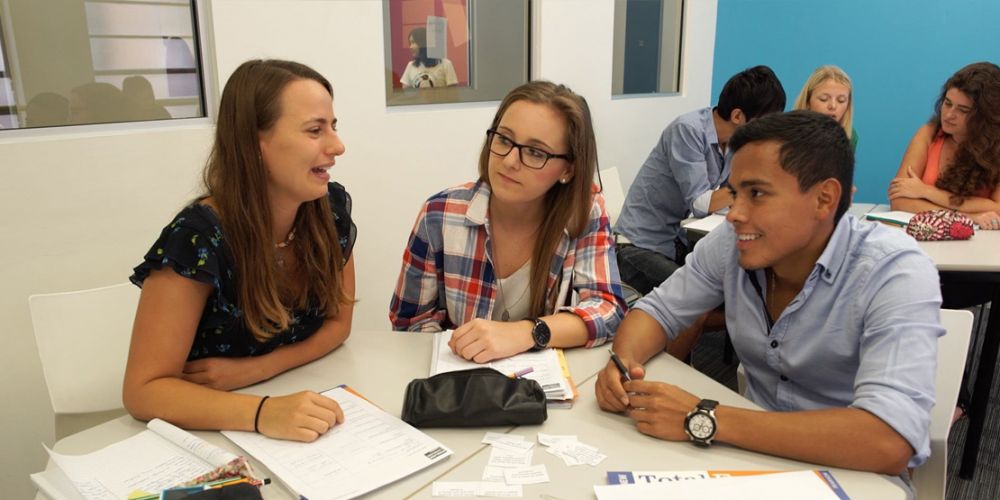


What are ELC’s Terms and Conditions?
Click here to read ELC's current Terms and Conditions.
What documents do I need to enrol at ELC?
ELC’s General English course is open to all adult applicants. There are no specific requirements. The only document you need to fill in is our enrolment form. It is available online (link) or as a pdf. Other courses require a minimum level of English, so to enrol in those, you will need to take our level test. Your agent will assist you with this procedure as we have different tests for different courses. Depending on the visa you would like to apply for and the country you come from, other documents might be required. Your agent will be able to advise you on this.
Where do ELC’s students come from?
ELC students are all international students, coming here to study English. In our day course, on an average day, you will find students from about 30 countries at school! Every student comes with an eagerness to meet people, learn about different cultures and make new friends, so this is a great chance for each of you to practice English every day.
Can I join several courses?
Many of students combine different courses throughout their studies with us and we highly encourage them to do so. Most start with a General English course and then move onto a Cambridge Exam Preparation or Academic English course when they reach the required level. When you arrive at ELC you will have a speaking interview with our Director of Studies or one of our Senior teachers. They will assess your level and you will be able to discuss your interests, needs and future plans. From there on, we will be able to customise a study plan to help you reach your goals.
What level of English do I need to gain direct entry through ELC?
Direct Entry agreements are based on equivalences. To enrol into a tertiary course that normally requires an IELTS 5.5, you will need to successfully complete our Academic English course with an EAP1 certificate. An IELTS 6.0 is equivalent to an EAP2 certificate. If your desired course usually requires an IELTS 6.5, you will need to graduate at EAP3 level.
How long do I need to study Academic English for to gain Direct Entry?
To be able to claim Direct Entry into one of our partner institutions, you need to study in our Academic English course for a minimum of 10 weeks. Over that period, the course will prepare you for an extensive range of academic study skills and language you will need for success in your future studies. However, depending on your level of English when you start and level required by the tertiary institution, you may need to study for longer. Many students first study 10-20 weeks General English and then 10-30 weeks Academic English to reach their required level for example. You could take our level test so that we can assess your current level and based on the level required for your future course we could recommend a study length and design your study plan with you.
What does Direct Entry mean?
ELC has direct entry agreements with a number of quality further education institutions in Australia. Each course delivered by these schools or universities has some entry requirements: these may include a certain score at your high school certificate in your home country, having previously studied certain topics or having graduated from a diploma course or degree in a relevant field for example. Another criteria to be able to enrol in these courses is a set minimum level of English and academic skills. Australian institutions commonly require international students to take the IELTS exam to demonstrate their level of English and academic skills. This is where studying at ELC will help you: ELC’s Direct Entry partners recognise ELC’s Academic English course to satisfy their English requirement. This means that by joining our Academic English course you will not need to take the IELTS exam: you save the cost of taking the exam and the stress! However, you will still need to meet all other entry criteria for your desired course.
When do I need to pay?
Payment is usually required 8 weeks before you start your course. However, depending on the extra services you would like us to arrange for you (such as accommodation or work program) your payment may be required earlier. In any case, your payment due date will be stated on your invoice and a confirmed place at ELC will be secured once all fees have been received as outlined on your invoice.
How can I pay?
ELC accepts many forms of payments, including international bank cheque, credit card and direct deposit. ELC holds an account with NexPay. NexPay is an international student payment platform which offers excellent terms and might save you currency conversion and transfer fees. Visit the NexPay website to calculate how much you could save. If you wish to use this payment system, you will need to sign up by clicking here and follow the prompts. If you are already in Sydney at the time of enrolment, you could also come to pay in cash.
What should I bring on my first day?
Please bring your passport, a copy of your visa as well as stationery for your first classes (a notebook and pens). You can bring lunch and place it in the fridge in the student kitchen when you arrive or you will be able to buy lunch from any of the shops in the food court just across the road.
At what time should I come on my first day?
If you are enrolled in a day course, you should come to school at 8:30 on your first day. If you are enrolled in an evening program, please come at 4pm on your first day (classes will start at 5pm on all other days after that). Simply introduce yourself to our receptionist and we will guide you from there.
I would like to learn to surf? Where can I take surf lessons?
There are many surf schools in Sydney and around where you could take lessons. However, we would recommend that you talk to our travel desk consultant or activities coordinator: we regularly organise weekend trips to a popular surf resort and groups of 10-30 students go all together for the entire weekend. You will get 4 x 2hr lessons over the weekend and the fun is guaranteed!!
What if my chosen accommodation option is not available?
With all accommodation types and room types, you have a lot to choose from. However, some are very popular and are booked up to 1 year in advance! So when you compare all options and choose your favourite one, also tell your agent what your second preference is in case you preferred option is no longer available. This will save time in the process.
When should I book my accommodation?
It is up to you but the earlier you book, the more options will be available, so we recommend that you look through our range of options at the same time as you book your course and book both at once. In any case, if you would like ELC to arrange accommodation for you, you need to book minimum 2 weeks before you arrive.
Which accommodation option do you recommend?
ELC offers a number of accommodation options of different standards but all are excellent value for money. Staying with a homestay family is the best way to become familiar with the Australian lifestyle ; Our Premium Apartment offers outstanding standards and is located inside a large international student residence: it is a best way to meet a lot of people very quickly – Plus it is located in the city centre, walking distance to school. But it is more expensive! Our Studyhouse and Link2 student houses are good quality shared houses walking distance to school, but they mostly feature twin rooms and are booked very early. CozzyStay offer numerous student houses of great standards at lower prices, but you will need to pay for public transport. Finally, staying at Glebe YHA youth hostel is the best way to meet travellers, save money and enjoy a laid-back atmosphere.
What are my visa options?
The majority of ELC students study on one of the following 3 visas: a visitor visa, a student visa or a Working Holiday visa. With a visitor visa, you can study with us for 2-12 weeks, either part-time or full-time at your convenience. You will not be allowed to work but will be able to combine study and travel in Australia. To qualify for a student visa, you need to enrol for a minimum of 12 weeks full-time. You will be allowed to work part-time during your course and will be able to travel for a few weeks only after the end of your course before your visa expires. Students aged 18-30 coming from certain countries have the third option of a Working Holiday visa. This is a 1 year visa on which you could study, travel and work as much or as little as you like. You can find all information you need on visas from the Department of Immigration’s website or your local Australian embassy.
Which countries are eligible to apply for a Working Holiday visa?
Students from the following countries can apply for a Working Holiday visa (417): Belgium, Republic of Cyprus, Denmark, Estonia, Finland, France, Germany, Hong Kong, Italy, Japan, Republic of Korea, Malta, Netherlands, Norway, Sweden and Taiwan. In addition, students from the following countries can apply for a Work and Holiday visa (462): Argentina, Bangladesh, Chile, Indonesia, Malaysia, Poland, Portugal, Spain, Thailand, Turkey and Uruguay. Visit the DIBP website for more information or to apply. Applicants holding passports from other countries are not eligible and should opt for another visa, such as a visitor or a student visa.
Which countries are eligible to apply for a Working Holiday visa?
Students from the following countries can apply for a Working Holiday visa (417): Belgium, Republic of Cyprus, Denmark, Estonia, Finland, France, Germany, Hong Kong, Italy, Japan, Republic of Korea, Malta, Netherlands, Norway, Sweden and Taiwan. In addition, students from the following countries can apply for a Work and Holiday visa (462): Argentina, Bangladesh, Chile, Indonesia, Malaysia, Poland, Portugal, Spain, Thailand, Turkey and Uruguay. Visit the DIBP website for more information or to apply. Applicants holding passports from other countries are not eligible and should opt for another visa, such as a visitor or a student visa.
Which ELC Work Program can I join on a Working Holiday visa?
Australia has a reciprocal arrangement with a number of countries for Working Holiday visas as well as Work and Holiday visas. If you hold a passport from one of these countries and are aged between 18 and 31 years old then you could qualify. A Working Holiday visa allows you to stay in Australia for 12 months from the date you first enter the country. During your stay you can study for up to 4 months (17 weeks) and take up short-term employment of not more than 6 months with any one employer. On this visa, you will be able to join any of ELC’s work programs, including Student Work Assistance Program (SWAP), Professional Internship, Conservation Volunteering and other work preparation programs. We recommend that you join Work and Travel Company (WTC), ELC’s sister company. WTC is a dedicated Working Holiday agency, offering the widest range of services to cater for your needs all along your Working Holiday year. Countries which currently have this arrangement with Australia are: Working Holiday visa: Belgium, Canada, Republic of Cyprus, Denmark, Estonia, Finland, France, Germany, Hong Kong, Republic of Ireland, Italy, Japan, Republic of Korea, Malta, Netherlands, Norway, Sweden, Taiwan and United Kingdom with more countries to join the scheme soon. Visit the DIAC website for more information or to apply: http://www.immi.gov.au/visitors/working-holiday/417/ Work and Holiday visa: Argentina, Bangladesh, Chile, Indonesia, Malaysia, Poland, Portugal, Spain, Thailand, Turkey, the USA and Uruguay. Visit the DIBP website for more information or to apply: https://www.border.gov.au/ Applicants holding passports from other countries are not eligible and should opt for another visa, such as a student visa or a visitor visa.
Which ELC Work Program can I join on a Student visa?
Students coming to study English for over 3 months generally apply for a student visa. In Australia, student visa holders must maintain more than 80% attendance at their school and may work for up to 20 hours per week on average. (Maximum 40 hours over a 2-week period). On this visa, you will be able to join our dedicated Student Work Assistance Program (SWAP). This program is specifically designed to help students at school look for a part-time job to help support themselves during their studies. It is free of charge for all students! In addition, there are a number of other work preparation programs you will be able to join while you are at school. After the end of your English course or during your holiday periods, you would be able to join our Conservation Volunteering program for a few weeks. Alternatively, some students apply for a subsequent visa to qualify for other programs, such as a longer Conservation Volunteering program or a Professional Internship. Conditions apply. Visit the DIBP website for more information or to apply: https://www.border.gov.au/
Which ELC Work Program can I join on a Visitor visa?
Students coming to Australia for sightseeing and to study English for a few weeks only generally apply for a visitor visa. This visa allows you to travel in Australia and study (maximum 3 months) as well as volunteer in non-for-profit organizations. On this visa, you will be able to join our Conservation Volunteering program. You will not be allowed to undertake paid work or carry out a professional internship. You will however be welcome to attend our SWAP sessions or join other work preparation programs to gain new skills and improve your CV and job prospects upon returning home or on your next travels.